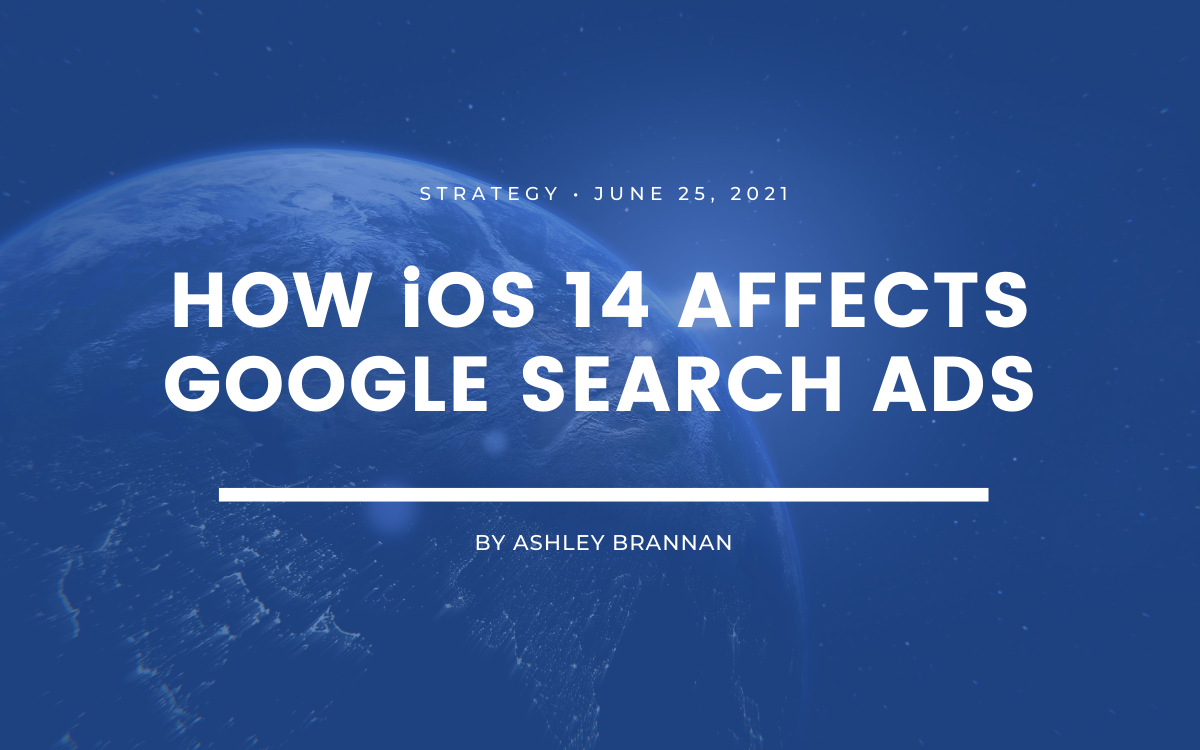How iOS 14 Affects Google Search Ads
3 min to read ✭ In this post, you'll learn how the Apple iOS 14 update will affect Google Search ads and how Google is adjusting to the changes.
In early 2021, Apple launched its iOS 14 update, which rocked the digital advertising world. In short, Apple’s goal in this new update was to protect user privacy by allowing website users to opt-in or out of app and website tracking. This has a big impact on nearly all forms of digital advertising, including Facebook, YouTube, and Google search.
How Will iOS 14 Affect Google Ads?
Just like Facebook and YouTube, Google Search ads historically provided very detailed demographic reports to give advertisers a better understanding of who is engaging with their ads. Because the new update limits the data provided for advertisers, advertisers will have less information to inform Google Ads optimizations. The good news is that Google Search ads still rely heavily on keywords to drive the traffic coming in and don’t necessarily need detailed demographic data in order to show ads to relevant traffic.
Changes to Conversion Attribution
Similar to Facebook, Google Search ads will be affected by conversion attribution changes due to the adjustments in 3rd party cookies. There will be fewer conversions attributed to Google Search ads since the platform will no longer be able to track detailed user journeys. Because of this, advertisers can expect to see a drop in direct reported conversions and under-reported data in the Google Ads platform. Additionally, even though Google Analytics will still be able to track that conversions are occurring, the platform will be unable to attribute data to specific platforms like Google Ads.
Remarketing Lists for Search Ads
Because users have the ability to opt-out of data tracking, Google Analytics will be unable to populate as accurate and complete remarketing lists as it has in the past. Remarketing lists for search ads (RLSA) can be used to retarget ads to a variety of custom audiences who have previously engaged with the website before. Advertisers are still able to use RLSA campaigns, but the list will likely begin to shrink as users opt-out of data.
Reduced Segmentation
It will be more difficult for advertisers to understand the demographics of users. Because of the decrease in information about a user’s gender, age, and income, it will become more difficult to fully define the audience that engages with ads.
Bid Cost Increases
Users’ past conversion rates inform Google’s automated bidding strategies and determine the quality score of keywords and ads. If there are less conversions coming into the account, the automated bidding strategies won’t reward accounts as much and will end up costing the advertiser more per click.
How is Google Adjusting to iOS 14?
As of June 2021, Google is still rolling out new tools that will be used to enhance advertiser experience despite the restrictions of iOS 14. Google has been preparing to adjust to having less data for years and is equipped to deal with the restrictions that may come.
Modeled Conversions
With the new update, fewer conversions will be able to be attributed to users coming from advertisements. Google Analytics will still be able to determine that conversions are being completed on-site, but will be unable to give credit to the ads and platforms that those conversions came from. Google has implemented modeled conversions, which uses predictive analytics to assign attribution to conversions that are likely to have come from specific ad channels.
Customer Match
Since RLSA data will be limited, first-party data is more valuable than ever before. Many advertisers will now have the option to use the Customer Match feature to input existing customer information to remarket to. This feature allows advertisers to target users who manually input their information on the website.
Google Analytics 4
The new Google Analytics update will give advertisers more detailed analytics into ad performance. The hope with this update is to supplement the data lost with more in-depth analytics to help advertisers inform optimization decisions.





